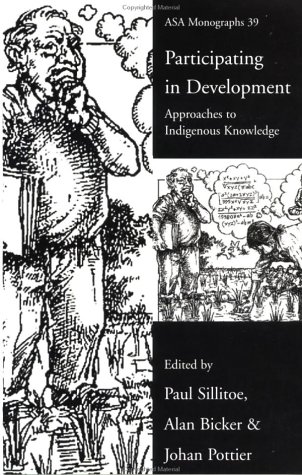

Most ebook files are in PDF format, so you can easily read them using various software such as Foxit Reader or directly on the Google Chrome browser.
Some ebook files are released by publishers in other formats such as .awz, .mobi, .epub, .fb2, etc. You may need to install specific software to read these formats on mobile/PC, such as Calibre.
Please read the tutorial at this link. https://ebooknice.com/page/post?id=faq
We offer FREE conversion to the popular formats you request; however, this may take some time. Therefore, right after payment, please email us, and we will try to provide the service as quickly as possible.
For some exceptional file formats or broken links (if any), please refrain from opening any disputes. Instead, email us first, and we will try to assist within a maximum of 6 hours.
EbookNice Team

Status:
Available0.0
0 reviews
ISBN 10: 0415258693
ISBN 13: 9780415258692
Author: Paul Sillitoe, Alan Bicker, Johan Pottier
Development has too often failed to deliver on its promises to poor nations. The policies imposed from above by international agencies and state bodies have frequently not met the needs and aspirations of ordinary people. Development agencies have been searching for sometime for alternative approaches. One of those being pioneered is 'indigenous knowledge', which aims to make local voices heard more effectively. However while it is increasingly acknowledged in development contexts, it is yet to be validated and accepted by anthropologists. It is self-evident to any anthropologist that effective development assistance will benefit from some understanding of local knowledge and practices. This therefore puts anthropology and anthropologists at the centre of development. This volume focuses on two major issues that anthropology might profitably address. First of all how to define indigenous knowledge and who should define it as it currently lacks disciplinary coherence. Secondly once this definition is achieved what methodologies should be used in such an interdisciplinary research endeavour when it must meet the demands of development (cost- and time-effective, intelligible to non-experts) while not compromising anthropological expectations. The new opportunities and their methodological implications are addressed in the chapters of this book in a range of ethnographic and institutional contexts and demonstrate how wide-reaching and how crucially important this debate has become. Participating in Development is a thought provoking and challenge collection. Its authors both define and validate the role of the anthropologist in development as well of development in anthropology.
Chapter 1: Participant Observation to Participatory Development: Making Anthropology Work
Anthropology’s Opportunity: Changes In Development Perspectives
A New Third Way for the Twenty-First Century
The Challenge of Indigenous Knowledge
What Is Indigenous Knowledge?
Some Methodological Challenges
Back to the Future
Bibliography
Chapter 2: Upsetting the Sacred Balance: Can the Study of Indigenous Knowledge Reflect Cosmic Connectedness?
Rights and Knowledge
Who Are Indigenous Peoples?
Knowledge, Space and Material
Indigenous Peoples and Their Knowledge
Indigenous Knowledge, Innovations and Practices
Moratoria and Criminals
Promoting Dialogue
Concluding Remarks
Notes
Bibliography
Chapter 3: Beyond the Cognitive Paradigm: Majority Knowledges and Local Discourses In a Non-Western Donor Society
Development Anthropology’s Problems
Japanese Indigenous Anthropology
Development Thinking from a ‘Peripheral Centre’: The Japanese Case
Ethnic Stratification and Social Exclusion In Japan
Japanese Anthropology As Local Knowledge
‘Asian Values’ and NGOs
Indigenous Knowledge and Social Movements
Japanese Reframings of Development Discourse
Japan, Development Discourses and Anthropological Theory
Concluding Remarks
Notes
Bibliography
Chapter 4: Ethnotheory, Ethnopraxis: Ethnodevelopment In the Oromia Regional State of Ethiopia
The Concept of Ethnodevelopment
The ‘Problem’ of the Oromo
An Oromo Theory of Development
An Ethnopraxis of Development
Conclusion: The Right to Participate In Development
Notes
Bibliography
Chapter 5: Canadian First Nations’ Experiences With International Development
First Nations Worldview
First Nations Historical Precedents
First Nations Reticence About International Development Assistance
Indigenous Peoples and International Development
First Nations Principles of Development
First Nations International Involvement
What First Nations Have to Contribute to Majority Culture Development: The Other View
What First Nations Might Find Interesting In International Development
Notes
Bibliography
Chapter 6: Globalizing Indigenous Knowledge
The First Dimension: Lines of Knowledge
Hierarchical Relations
The Second Dimension: Wheels of Knowledge
The Third Dimension: Globes of Knowledge
Knowing It All: The Culture Concept
Universes of Knowledge
The Fourth Dimension: Time and Knowledge
Local to Global and Back Again
Notes
Bibliography
Chapter 7: Negotiating With Knowledge At Development Interfaces: Anthropology and the Quest for Participation
Whose Participation, Whose Development?
Opportunities for Anthropology to Engage Practically In Development As Never Before
Combining Academic Anthropology With the Participatory Approach: New Opportunities for Local Communities?
The Prerequisites of Participatory Research
Problems Combining Academic and Participatory Research: Evidence from Practice
Conclusions: Opportunities At the Interface
Notes
Bibliography
Chapter 8: Indigenous Knowledge, Power and Parity: Models of Knowledge Integration
Why Problematize Knowledge and Power?
Current Models of Integration
The Emphatic Learning and Action (ELA) Model
The International Labour Organization, World Bank, Canadian International Development Agency, KIVU Nature, Inc. (IWCK) Model
Towards a Model of ‘Equitable Integration’ (EI)
Theoretical Assumptions
Assumptions About Knowledge
Treating Project Actors As Stakeholders and Community Representatives
Penetrating Power: Contexts of Planned Discourse (COPD)
Conclusion
Notes
Bibliography
Chapter 9: Interdisciplinary Research and GIS: Why Local and Indigenous Knowledge Are Discounted
Geographic Information Systems: Promise and Problems
Botswana and the Range Inventory and Monitoring Project
Contending Discourses On Environmental Change
Rural Livelihoods and Sustainable Natural Resources
Concluding Remarks
Notes
Bibliography
Chapter 10: Indigenous and Scientific Knowledge of Plant Breeding: Similarities, Differences and Implications for Collaboration
The Problem: Scientific Maize Breeding and Local Farmers
Comparing Local and Scientific Knowledges As the Basis for Collaboration
Methods
Farmers
Plant Breeders
Conclusions
Note
Bibliography
Chapter 11: “Déjà vu, All Over Again”, Again: Reinvention and Progress In Applying Local Knowledge to Development
The History of Indigenous Knowledge
Proliferating Kinds of Knowledge
Science and Indigenous Knowledge
Context, Context, Context…
Participation and Power
Anthropology’s Unresolved Relationship With Development
participating in professional development
4.2.3 themes of development
concept development 9-3
concept development 8-2
6-12 development
Tags: Paul Sillitoe, Alan Bicker, Johan Pottier, Development, Indigenous